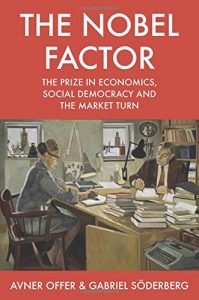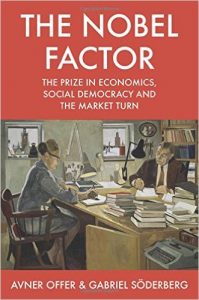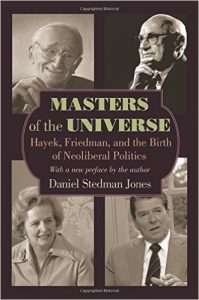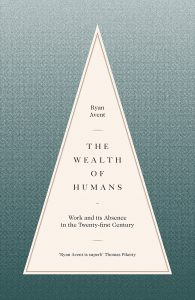The Nobel Factor: The prize in economics, social democracy and the market turn by Avner Offer and Gabriel Soderberg is quite an interesting read (if for a niche market) but it’s a book of two parts, albeit braided together. One story is about the decline of the solid post-war social democratic consensus in Sweden over the years. The book argues that the creation of the prize by the Swedish central bank was one of the vehicles for ‘the market turn’, which in the UK had the Institute of Economic Affairs and Margaret Thatcher as its institutional vector, and will have had others elsewhere. Perhaps the prize helped the market turn elsewhere. The book concludes: “The existence of a Nobel prize in economics implied that the ‘market turn’ since the 1970s was scientifically grounded, and that it was objectively necessary.”
The other strand of the book looks at the recipients of the economics prize since its launch in 1969. The argument is that the dominance of Assar Lindbeck on the awarding committee meant the kind of economics that was recognised took a market turn of its own in the1990s with the recognition of Robert Lucas, Robert Merton & Myron Scholes, Ronald Coase and Gary Becker. One of the problems with the book’s thesis, however, is that so many of the winners have clearly not been free marketeers. Indeed, the recipients have arguably tended more strongly toward the maverick free thinkers than in the profession as a whole, and there have certainly been many ‘liberal’ (American sense) winners. Think of Herbert Simon, Joe Stiglitz, Paul Krugman, Robert Solow, Robert Shiller, Elinor Ostrom, Amartya Sen, Daniel Kahneman ….. There are a couple of chapters calculating the ideological leanings of the winners, and it shows the left ahead of the right for all but the periond 1990-97. This figures: the high tide of free marketry in the profession was the 1980s, and significant proponents were awarded the prize about a decade later. As the book notes, the character of economics (in the world of research at any rate) has changed substantially since then.
So if anything, these calculations suggest that to the extent the existence of a prize gave economics ‘scientific’ credibility, it was a liberal, institutionalist, historically and psychologically rich kind of economics! The other point is that there are few, if any, winners who would not be acknowledged by other economists (however grudgingly) as significant intellectual pioneers. Even if you disagree with their political leanings or their economic models, the prize is no mickey mouse affair.
In sum, an interesting book for the economics community, but one whose argument did not convince me.





